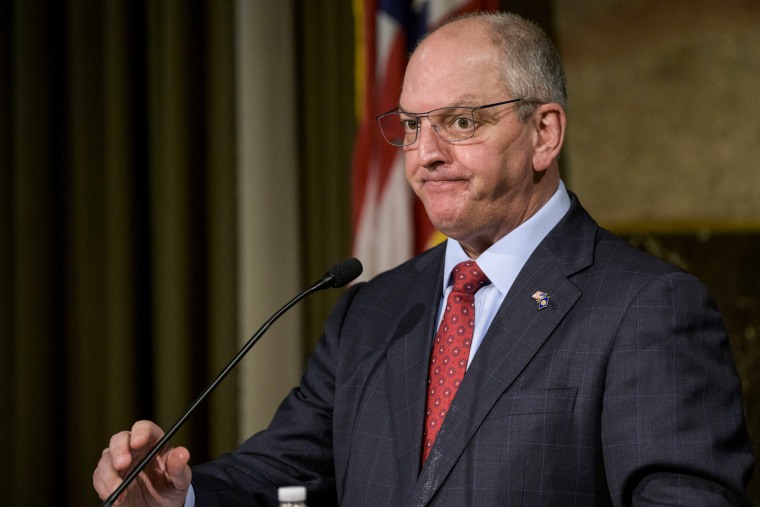Louisiana became the 18th state to bar transgender women and girls from playing on female school sports teams Monday after the state's Democratic governor chose not to veto or approve the bill.
Both chambers of the Republican-controlled Legislature passed the bill last month, and Gov. John Bel Edwards said during a news conference Monday that he would not sign the bill, but he also wouldn't veto it. Under Louisiana law, any bill passed by the end of the Legislative session becomes law if the governor doesn't take action on it.
Edwards said the bill "was going to become law whether or not I signed it or vetoed it," citing the fact that it had more than two-thirds majority support in both chambers of the Legislature — which would allow for a legislative veto override.
The bill, called the Fairness in Women's Sports Act, requires that schools "designate intercollegiate and interscholastic athletic teams according to the biological sex of the team members." It defines "biological sex" as the sex listed on a person's birth certificate at the time of their birth. It also explicitly states that teams designated for females are "not open to participation" by anyone whose birth certificate said male, which specifically excludes trans girls and women.
The bill will become law Aug. 1 and will apply to public elementary, middle and high schools, as well as public universities. It will also apply to any private school or university that receives public funds.
The bill gives students and others the ability to sue schools who allow trans girls and women to play on female sports teams, and prevents action taken against anyone who reports a school who violates the law.
Edwards vetoed a similar bill last year calling it "a solution in search of a problem that simply does not exist in Louisiana."
He reiterated that stance Monday and said there still "hasn't been a single instance in Louisiana of a trans girl participating in sports," but that he has allowed the bill to take effect because he anticipates that the Legislature would have overridden his veto, especially now that the bill's scope is more narrow and doesn't affect intramural sports.
"I think it’s unfortunate but it is where we are," Edwards said. "And I hope we can all get to a point soon where we realize that these young people are doing the very best that they can to survive."
He added that the effect of the bill, "whether it's intended or not," is to "send a strong message to at least some of these young people that they shouldn’t be who they think they are, who they believe they are, who they know that they are. And I find that very distressing. I do believe that we can be better than that."
Republican state Sen. Beth Mizell has said she sponsored the bill to protect cisgender girls and women, who identify with their assigned sexes at birth, from having to compete against trans girls, whom she believes have an inherent physical advantage, local outlet the Louisiana Illuminator reported.
Some proponents of the legislation also argue that it does not ban transgender students from participating in athletics, because they can participate on the team that matches their assigned sex at birth.
But advocates who sued to stop a similar law from taking effect in Idaho disagree with that point of view.
During oral arguments in front of the 9th U.S. Circuit Court of Appeals last year, Chase Strangio, an attorney for the American Civil Liberties Union, argued that a lower court had previously found that it “is not feasible to force a trans girl to compete on a team for boys,” crediting expert testimony from Dr. Jack Turban, a child and adolescent psychiatry fellow at Stanford University, and testimony from Lindsay Hecox, a trans college student and one of the plaintiffs suing over Idaho's law.
Strangio argued that competing on the boys' team would've undermined Hecox's medical treatment and "would be so substantially humiliating to her" that it's not an option.
A ruling is expected in that case soon, The Associated Press reported.

